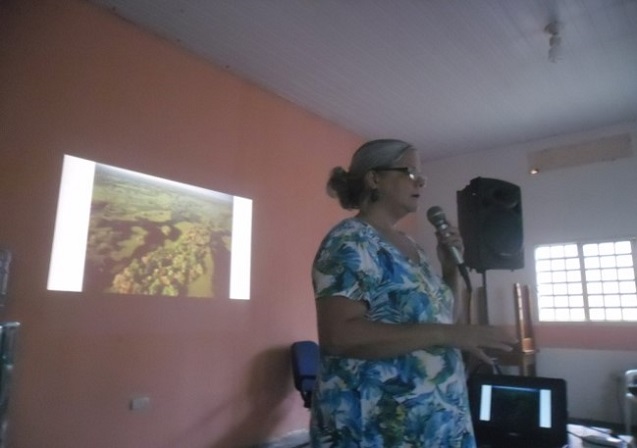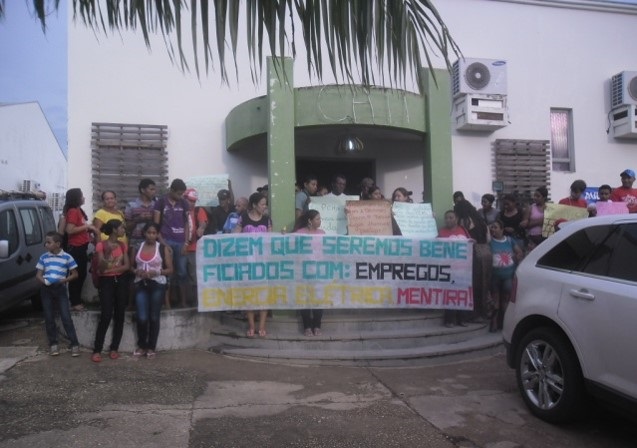Counterpower has to find its own weapons to fight the main power
Guest blog by Debora Calheiros, Brazil
The situation for environmental organisations in Brazil is difficult. The governments, in general, don't think environmental issues are relevant. So even though there are good laws that protect natural reserves like the Pantanal, the governments do not comply with these laws because they put economic interests above the environment.
As the counterpower has little money compared to the economic powers, we have to fight them with our own weapons like science and organization of social movements.
For example, in the Pantanal Wetland the government plans a hidrovia (waterway) project. They want to deepen and straighten the Paraguay River so that it can easily be navigated from Brazil all the way up to Argentina. This would have a huge impact on the whole Pantanal.
ICV (Instituto Centro de Vida), one of the oldest NGO's in the region, has been working together with researchers and a coalition of hundreds of NGO's to fight this hidrovia project since 1992. A large part of the plan was cancelled in 1996, but in 2012, this project came on the agenda of the government again. So ICV, within the Ecosystem Alliance (EA), had the idea to look for new ways to fight. They organized activism classes for social movements to think of creative resistance strategies.
There, the idea emerged to prevent the government from holding public hearings about the hidrovia project. These public hearings are obligatory by law before they can give licenses to companies to implement a project. In a public hearing, the people are informed about the project and can give their opinion. However, overall, the governments don't take these opinions into account and just organizes the hearings because they have to as part of the licensing process. The social movements strategically thought 'no hearing means no license' and planned to disturb the hearings.
FONASC, an NGO that participated in the Ecosystem Alliance in Brazil, called together fishermen, other local people and civil society organisations. I, as a scientist, explained them the scientific reasons to fight against the hidrovia project. For example, for fishermen it will mean that many fish species will disappear, which they need to survive, to maintain their quality of life, food security and income. Then they decided to react and took action to disturb the public hearings: at one of the meetings they made a human chain around the building so nobody could get in, and at another meeting they went inside and made noise with whistles. Both hearings had to be cancelled. So they succeeded: no hearing meant no license!
Debora Calheiros from Brazil is a PhD biologist and wetlands ecologist. She has been involved in the Pantanal for 27 years. From 2012 to 2015, she voluntarily worked with Both ENDS, Wetlands International and IUCN NL in the Ecosystem Alliance to protect the Paraguay River/Pantanal Wetland system from projects like the hidrovia project and other threats.
 |
 |
| Debora Calheiros informs the fisherman about the consequences of the hidrovia project |
Protests around the public hearing in Barro do Bugres |
Read more about this subject
-
Publication / 19 April 2016
-
 Video / 24 November 2014
Video / 24 November 2014Certification and beyond - Solutions for responsible agro-commodity governance
The impacts of large-scale soy and palm oil production explained by local experts.
-
 News / 16 August 2016
News / 16 August 2016Art as a powerful messenger: music from the Pantanal
10 songs: that is the result of a 4 day long, 450 km boat trip through the Pantanal with 36 people. The project Pantanal Poética sought and found a new way to look at the Pantanal, a valuable but threatened nature reserve on the border of Brazil, Bolivia and Paraguay.
-
 News / 13 April 2015
News / 13 April 2015The Pantanal, the world’s largest waterland, is under serious threat
For several decades, Both ENDS has been closely following the developments in this large water area in the centre of South America. We work closely with organisations which aim to ensure that the local population knows about these developments and, if necessary, protect it from these changes. But why is this area both so special and important for the whole of South America? And what exactly is threatening this area? C. Cornell Evers, independent photographer and writer, spoke with Tamara Mohr of Both ENDS and Sander van Andel of IUCN to find answers. The result of this meeting is an interesting interview.
-
Publication / 10 July 2019
-
 News / 2 November 2015
News / 2 November 2015Not soy, but music in the Brazilian Pantanal!
The Pantanal, in the heart of South America, at the border of Brazil, Bolivia and Paraguay, is the world’s largest freshwater wetland with an extremely rich biodiversity. Tourism and fishing are the main sources of income for the local population. This enormous natural area is invaluable for the water management of a large part of the continent, stretching all the way down to the Argentinian La Plata area, some 1,500 kilometres away. The area faces many threats and Both ENDS therefore already started actively supporting local organisations striving to protect the Pantanal in 1994.
-
Publication / 5 December 2012
-
 News / 26 September 2018
News / 26 September 2018Temporary ban on new hydro dams in the Brazilian Pantanal
Good news from Brazil! The National Water Agency (ANA) has stopped issuing new permits for the construction of hydroelectric dams in the Brazilian Paraguay river basin, which is part of the Pantanal wetlands in South-America. The suspension will last at least until May 2020, after the publication of a comprehensive socio-economic and environmental impact assessment that the ANA started in 2016.
-
Publication / 7 November 2018
-
Publication / 8 May 2019
-
 External link / 21 September 2016
External link / 21 September 2016 -
 News / 15 November 2018
News / 15 November 2018All Eyes on the Amazon: the future of protecting forests in Brazil
On Wednesday, November 14, Dutch Newspaper De Volkskrant published a joint op-ed by Both ENDS, Hivos, Greenpeace Netherlands and Witness about the deforestation in the Amazon region which is still going on rapidly, having disastrous consequences for the indigenous people who live in the area, for biodiversity and for the climate. The Netherlands is one of the largest buyers of Brazilian agricultural products such as soy and beef, and should ensure that deforestation, land grabbing and human rights violations do not occur in these production chains. Unfortunately, this is not at all the case yet.
-
 News / 10 February 2020
News / 10 February 2020Civil society groups assert their right to expose the impacts of palm oil production
Civil society organisations from around the world condemn the statements by representatives of palm oil companies during a meeting with the Malaysian government. In this meeting, the company representatives called critical NGOs "toxic entities" and asked the Malaysian government to not let these NGOs into the country. Both ENDS' partners have published a reaction in which they defend their right "to expose the realities we face in their communities about the impacts of the palm oil sector".
-
 News / 15 November 2018
News / 15 November 2018Silence
Silence can sometimes say more than a thousand words. When colleagues from our partner organisations tell us their stories,* our reaction is often silence; a dejected silence.
-
 News / 21 September 2017
News / 21 September 2017Civil society is being silenced
September 22nd websites of civil society organisations and NGO's all over the world will go black, in protest and solidarity. Protest against the shrinking space for civilians and organisations to speak out, unite and protest peacefully.
-
 News / 12 October 2018
News / 12 October 2018The Soy Coalition ended, but the work must and will go on!
After 15 years, the members of the Dutch Soy Coalition have decided to disband the coalition. A total of 16 civil society organisations have worked together for many years to put the negative impact of the production, transport, processing and consumption of soy on the agenda and to seek solutions together with other stakeholders.
-
Publication / 12 October 2018
-
Publication / 26 August 2020
-
 Dossier /
Dossier /Global Alliance for Green and Gender Action (GAGGA)
GAGGA rallies the collective power of the women's rights and environmental justice movements to realize a world where women can and do access their rights to water, food security, and a clean, healthy and safe environment.
-
 News / 28 September 2018
News / 28 September 2018Joan Carling is awarded with the UN’s highest environmental honor!
We congratulate Joan Carling, member of the permanent commission on indigenous peoples of the UN, for having received the Lifetime Achievement Award as 'Champion of the Earth' by the UN Environment! This is the UN's highest environmental honor, given to six of the world's most outstanding environmental change makers once a year.












